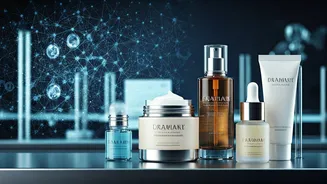The Science of Skincare
Skincare trends, especially those that quickly gain popularity through social media, often promise miraculous results. However, the true effectiveness
of these trends frequently hinges on the scientific evidence supporting them. The skin, as the body's largest organ, has a complex structure involving layers that act as a barrier against external factors. Proper skincare supports this barrier function, which is critical for maintaining skin health. Ingredients interact with this barrier in different ways, influencing factors like hydration, elasticity, and protection against environmental stressors such as UV radiation and pollution. Understanding these scientific principles is crucial for distinguishing between proven methods and unfounded claims. Numerous scientific studies and clinical trials scrutinize skincare ingredients and their mechanisms of action, allowing researchers to evaluate the claims that many skincare products make. By considering the scientific foundation of these trends, individuals can make more informed decisions about incorporating new products or practices into their routines. This promotes a smarter approach to skincare, one that prioritizes health and real-world results over passing trends.
Hydration and Skin Health
One of the most essential aspects of skin health is maintaining proper hydration. The skin requires adequate moisture to function correctly. This is because water plays a crucial role in numerous biological processes such as nutrient transport, and waste removal. Hydration also affects the skin's barrier function, strengthening its ability to ward off irritants and infections. Several skincare trends focus on boosting hydration, using ingredients like hyaluronic acid and ceramides. Hyaluronic acid is particularly effective at attracting and retaining water molecules, hydrating the skin's surface and reducing the visibility of fine lines. Ceramides, naturally present in the skin, help to seal in moisture and protect the skin's barrier. The best way to hydrate the skin is not just by applying external products but also by maintaining a high water intake. Consuming sufficient water is essential for keeping the skin hydrated from within, assisting with cellular processes, and giving the skin a healthy appearance. Combining internal hydration with the use of hydrating skincare products provides a holistic approach to ensuring the skin's moisture levels and overall well-being.
Sun Protection is Vital
Protecting the skin from the harmful effects of the sun is a fundamental principle of effective skincare, frequently emphasized in many scientific studies and clinical recommendations. Ultraviolet (UV) radiation from the sun is a primary cause of premature aging, including wrinkles, age spots, and the loss of skin elasticity. Exposure to UV rays also substantially increases the risk of skin cancer. Sunscreen is the most commonly used form of sun protection and works by either absorbing or reflecting UV radiation before it can damage the skin. Choosing a broad-spectrum sunscreen that protects against both UVA and UVB rays is crucial for comprehensive protection. Additionally, wearing protective clothing, such as hats and long sleeves, and seeking shade during peak sun hours further help limit UV exposure. Repeated use of sunscreen is recommended, particularly during outdoor activities or when prolonged exposure to the sun is expected. By integrating consistent sun protection into daily skincare routines, individuals can effectively prevent damage and keep the skin healthy and youthful.
Evaluating Exfoliation Techniques
Exfoliation is an essential part of a healthy skincare routine that removes dead skin cells. The process enables the skin to maintain a brighter, smoother appearance. There are several popular exfoliation techniques, each having its own specific methods and effects. Chemical exfoliants, like alpha-hydroxy acids (AHAs) and beta-hydroxy acids (BHAs), are commonly used in skincare. AHAs, found in products like glycolic and lactic acid, work by loosening the bonds between dead skin cells, helping them shed more easily. BHAs, such as salicylic acid, are oil-soluble and beneficial for deeper exfoliation, especially for those with oily or acne-prone skin, penetrating pores to remove impurities. Mechanical exfoliation involves using physical scrubs or tools to remove dead skin cells. These scrubs are typically made with small particles like sugar, salt, or beads, which manually scrub the skin's surface. Choosing the right exfoliation method depends on the individual's skin type, sensitivity, and concerns. Over-exfoliation can cause irritation, redness, and inflammation, so it is important to incorporate exfoliation cautiously and observe how the skin responds. Proper exfoliation can improve skin texture, but it needs to be carried out correctly and consistently.
Antioxidants and Skincare
Antioxidants play a crucial role in skincare by protecting the skin from environmental damage. Environmental stressors like pollution, UV radiation, and other factors generate free radicals, which are unstable molecules that damage skin cells, accelerating the aging process and contributing to skin problems. Antioxidants neutralize these free radicals, effectively preventing oxidative stress and its associated damage. Vitamin C is a popular antioxidant in skincare, known for its ability to brighten the skin, reduce the appearance of dark spots, and provide some protection against UV damage. Vitamin E, another potent antioxidant, works synergistically with vitamin C to enhance its effects and helps to moisturize the skin. Topical application of antioxidant-rich serums or creams helps combat oxidative stress, leading to improvements in skin health and appearance. Using a diet rich in antioxidant-rich foods can also support skin health, as nutrients are absorbed through the body and aid in repairing and protecting the skin from the inside out. Combining topical antioxidants with a healthy lifestyle offers a comprehensive approach to anti-aging and skin wellness.
Trends Worth Following
While many skincare trends are short-lived, some practices are supported by solid scientific evidence and are worth incorporating into your routine. Incorporating proven ingredients like hyaluronic acid for hydration, retinoids for anti-aging and acne treatment, and consistent sun protection are essential for preserving the skin’s health and vitality. Focus on building a consistent, personalized skincare routine based on individual skin needs. Understanding your skin type and concerns is the foundation for using skincare products that provide the best results. Moreover, the long-term benefits of any skincare trend are not always immediately visible. Patience and consistency are crucial. By combining scientifically supported ingredients with a diligent and personalized routine, individuals can successfully navigate the world of skincare trends and improve their skin’s overall health and appearance. A mindful approach, coupled with informed choices, ensures that skincare enhances rather than harms.







![[WATCH] 'Real Madrid, Ramadan and rest' - Mohammed Siraj how last-minute World Cup call-up changed February plan](https://g-mob.glance-cdn.com/public/fc/image/ByYT_LEmlrD0.webp)







